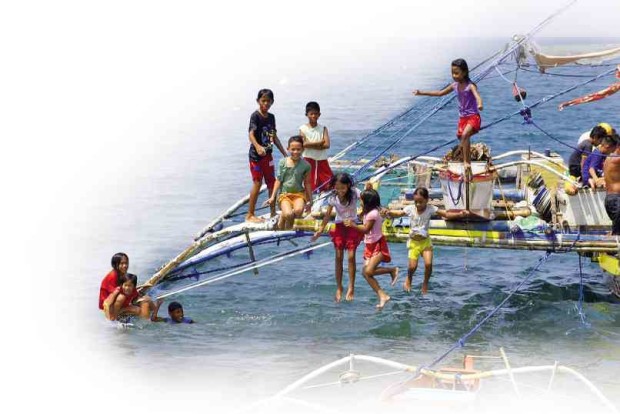
CHILDREN play on a fishing boat in the coastal village of Cato in Infanta town, Pangasinan province unaware of the stories that their fishermen fathers bring with them about their tense encounters with Chinese coast guard vessels in the Scarborough Shoal, also known as Panatag. WILLIE LOMIBAO/INQUIRER NORTHERN LUZON
INFANTA, Pangasinan—“Filipino, go!”
Those two words continue to ring loud in fisherman Romulo Ferrer’s ears, coming from a Chinese coast guard vessel that threateningly approached the fishing boat that Ferrer and seven other fishermen took to Scarborough Shoal, also known as Panatag Shoal, in the West Philippine Sea where Ferrer had been earning a livelihood catching fish nearly half his life.
Ferrer recounted the tense encounter in an interview with Inquirer.
He said for more than eight days, he and his fellow fishermen on board the boat Joenel 3, fished near Panatag Shoal without any incident although their boat was within striking distance of a Chinese coast guard vessel, one of such ships guarding the shoal.
“We knew that they (the Chinese) saw us,” said Ferrer. “But we assumed that, maybe, they would just allow us to fish,” added the 46-year-old Ferrer.
He said Joenel 3 left the village of Cato here on March 4. By dawn of March 5, Ferrer said, he and the other fishermen set up fishing gear on a spot near Panatag Shoal.
But on March 14, Ferrer said a rubber boat from the Chinese coast guard ship approached Joenel 3 and repeatedly blared, “Filipino, go!”
“So, we left, and anchored 10 nautical miles (18.52 kilometers) away from the shoal,” Ferrer said.
Scarborough, also known as Panatag Shoal and Bajo de Masinloc, is about 260 kilometers from this town.
It serves as a midsea refuge for fishing boats during stormy weather at sea. It used to be a free zone for local fishermen until Chinese coast guard vessels began patrolling the West Philippine Sea.
At dusk, Joenel 3 returned to the shoal, carefully approaching the area to avoid being seen by the Chinese coast guard. Later at 7 p.m., Ferrer said, a fishing boat from Sta. Cruz town in Zambales province arrived in the shoal. This was the GGM 3, whose skipper was Mundot Etac, a resident of Cato. His seven crew members were also from this town.
GGM 3, Ferrer said, was quickly detected by the Chinese coast guard. They approached Etac’s boat with blinking lights. But Etac did not veer from its course and continued to sail to the shoal.
“When GGM 3 sailed near the Chinese ship, [crew members from each boat began] hurling bottles and rocks,” Ferrer said.
“We turned off our lights and left the area fearful that the Chinese ship would hit us with water cannons. We also warned other boats to stay away from the area,” he said.
GGM 3’s glass windows were shattered and one of its outriggers was broken, Ferrer said, citing various accounts. He said the boat was still at sea and had not returned to Subic town in Zambales.
Wilfredo Nantes, a fishing boat operator here, said fishermen still fish at Panatag Shoal despite the risks to recover their expenses for fishing trips.
“Each trip costs about P60,000, so you have to catch fish worth more than P60,000,” said Nantes. Prices of fish have been fluctuating, he said, making it more difficult for fishermen to recoup their capital.
“For instance, the fish we call ‘dorado’ is now P40 a kilogram. If you catch 1,000 kg of Dorado from the payao (artificial reef), that’s only worth P40,000. So you have to catch some more and you go to the shoal,” Nantes said.
At Scarborough, Nantes said, the more valuable lapu-lapu (groupers), talakitok (jack) and ungayan (unicorn fish) are easier to catch. Fishermen use lines in the payao and spear gun in the shoal.
Ferrer, who had been fishing in Scarborough for the last 15 years, said he would continue to return to the place because it is the only source of his livelihood.
“That place is ours. I hope our government will drive away the Chinese there so that we can fish there without any disturbance,” he said.
In April last year, Ferrer was one of the 80 fishermen from the provinces of Pangasinan, Zambales and Bataan who were chased away from the shoal by water cannons fired by a Chinese vessel.
In January 2014, Chinese vessels fired water cannons at a group of Infanta fishermen while their boats were anchored at the shoal to avoid huge waves whipped up by strong winds at that time.
RELATED VIDEOS